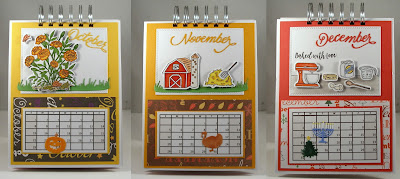Hi, Lois here again with the third and final post explaining how my flip calendar was constructed. In addition, I will show how I made the base.
Supplies used in this post:
CottageCutz stamps/dies – On the Farm, Baking in the Kitchen, Aster Flower – September, Marigolds Flower – October
Copic markers
Foam pop dots
I then constructed my scenes, as before, adding whatever icons I wished for each month.
Now I was ready to build my base. It needed to be rather sturdy, so I used heavyweight cardboard. I cut two panels slightly narrower (5 ¼”) than my calendar pages and 3 ½” longer (10 ¾”). I scored one of the panels at 7 ¼” and 9”. The other one I scored at 7 ¼”, but then I cut off 1 ¾” from the end. This would allow me to be able to fold the base more easily – with less bulk. In addition I cut a small “hinge” for the top 5 ¼” x 2”, scored at the 1” midpoint.
Using a Zutter Bind-It-All, I punched six holes, centered, at the top of the two base panels and at the mid-point of the “hinge” and then applied two-sided adhesive tape on the “hinge” and the lower panel of the shorter base piece.
Carefully, I attached the pieces together to form the base.
Again, using the Bind-It-All, I punched holes at the top of each calendar page, making sure that they were centered in the machine before I punched.
Using a 1” Zutter wire, I attached the calendar pages to the base. And my calendar was finished.
At the end of each month, just flip the page and reveal the following month. After the June page is flipped, all that is necessary is to turn the calendar around for July.
And, if you wanted to be able to use the calendar again the following year, all you would have to do is make new monthly calendars and carefully replace the old ones. Here are all the completed pages of my calendar.
I hope you enjoyed the process of making this calendar. Maybe you'd like to try making one yourself.
CottageCutz stamps and dies used on today's post are:














































